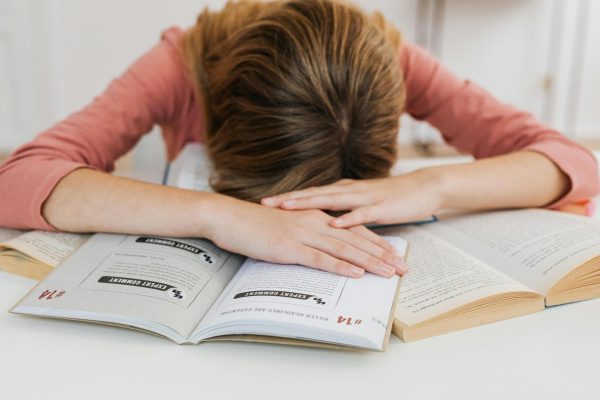OPINION: Having high or low GPAs does not eliminate school anxiety
April 21, 2017
Whether you’re the valedictorian of the graduating class or a student struggling to get by, one’s GPA could have a serious impact on his mental health. The National Assessment of Educational Progress conducted a study in 2016 and found that only 32 percent of students have the luxury of saying their GPAs are “acceptable enough” for the colleges they want to apply to. Whether this means teens have unrealistic standards or they just come really close to their goal, this statistic supports the idea that having a low or high grade point average can be very stressful on teens. For the students who are fortunate enough to do well in class, their GPAs still act like a daunting dark cloud over their heads.
Junior Zach Zerance prides himself on being able to achieve above average grades in his classes, but acknowledges how difficult it is to excel at this level. “Maintaining almost all A’s in my classes can be very challenging, especially during football and track seasons. He said there are nights when I’m up until one o’clock in the morning doing my AP Language homework.”
Students who play sports and obtain a high GPA often have no choice but to finish their homework and study for tests at ridiculous hours at night. Participating in a sport is truly a major commitment, since it takes so much time and makes it even more challenging to do well in school. Sophomore Cameron Marino explained how difficult juggling athletics and school work could be. “During soccer season, I notice my grades aren’t as high and usually try to make up ground academically in the offseason. This doesn’t take away the stress and anger I feel when I’m not performing as well during the fall,” she said.
Another factor that contributes to a student’s inability to maintain the grades they want, are from taking too many advanced placement classes. The jump from honors to AP requires a lot more effort and time from students, so taking more than one could be overwhelming for many.
“Looking back on it, I regret taking so many AP classes because it became too much for me,” said Milad Mirghahari, who went from taking 3 APs last year and now is enrolled in 6 this year. “My parents thought I should challenge myself even more with my success from last year. But now, I actually have a lower overall GPA than I did my junior year, so there really is no point.”
According to The National Assessment of Educational Progress in 2015, approximately 50 percent of students say they took more AP classes than they should have. However only 10 percent of these students drop out, probably so they don’t lose AP credit from previous years and because it doesn’t look good for college. Students should not prioritize the amount of AP courses, since a cumulative marking period GPA does not apply for any future endeavors.
In addition, parents and teachers need to stop pressuring teens so much about their academic performances. USAToday.com conducted a survey in 2014 that said 65 percent of 1,000 students are worried over their grades during the school year. They also reported these teens experience various symptoms such as depression, anger and self doubt. Schools and families need to encourage their children, rather than pressuring them to perform better.
The study found that more than half of the students strained by their academics, is a result of their parents and teachers high expectations. Rather than belittling their children for doing poorly on a test, guardians of these teenagers need to give comfort and help, so they’ll be more successful going forward.
Despite all the added pressure from parents, teachers, sports and AP classes, there are many students who prove it’s still possible to maintain a good GPA. However, this does not mean their mental health isn’t compromised in the process. Students need to be reminded that there’s a college for them.
Too often, there are teenagers complaining and worrying about how their GPA’s aren’t acceptable for the college of their dreams. Whether they have a low, high or average GPA, students need to believe they can find success later in life.
Teachers, classmates, family members and other people should make any effort to encourage these students with words of wisdom and motivation. Even though a student’s overall GPA may be the most important factor colleges look at, there are still clubs, community service, sports and other extracurricular activities that could help students get into better universities.
There’s more to a student than just their low or high GPA, therefore they should not be suffering from mental illness because of a number that “determines” their overall intelligence.










